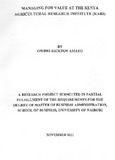| dc.description.abstract | Stakeholders have become more enlightened, have a wider array of choices and have
become more demanding. In order for an organization to prosper it has to satisfy the
interests and expectations of key stakeholders by providing value. Thus organizations
have to adopt a value orientation by setting the right climate, competence and capacity
to deliver value to stakeholders.
The Kenya Agricultural Research Institute (KARI) has made a commitment to
enhance value to its stakeholders and is undertaking a number of measures to drive it
towards creating and delivering value. This study sought to identify the key
stakeholder value requirements that KARI is seeking to fulfill and to establish how
KARI is managing for value. In order to arrive at the results the study identified the
key stakeholders of KARI, what KARI perceives as the value requirements of its key
stakeholders, and how KARI is managed to ensure that the value of these stakeholders
is enhanced.
The data was collected by way of interviewing three respondents who are senior
managers at KARI and thus have a deep organization-wide understanding of the
operations and practices undertaken at KARI. Secondary sources were also used to
complement the primary data that was collected.
The study shows that KARI aims to fulfill the value requirements of its key
stakeholders who include the farming community, the government, KARI employees,
collaborating partners, and suppliers of goods and services. It was found that KARI is
undertaking measures to ensure that it meets the expectations and value requirements
of its stakeholders by committing to certain key targets through performance
contracting system, adopting ISO 9001:2008 Quality Management System; adopting a
participatory approach to research; involving players in the Agricultural Product Value Chain (APVC); forming multi-disciplinary research teams; procurement of
goods and services from responsive sources; forming strategic alliances, partnerships
and collaborations; undertaking human resource management practices that
contribute to the realization of its strategic goals; devolution of research locations to
facilitate faster response to clients needs. The study reveals that KARI is constantly
undertaking measures that enhance the value delivered to its stakeholders.
The study however reveals that some of these initiatives are carried out in a disjointed
manner and hence recommends that KARI management consider the integration of
these practices since it may lead to greater value. In addition in order for all
employees of KARI to gain greater appreciation of the significance of fulfilling
stakeholder expectations KARI should sensitize them and offer incentives that
motivate them towards contributing greater value.
KARI is an org that has operations carried out in many regions across the country.
Some of these practices may not be uniformly applied across the organization since
data collection was mainly concentrated at a single station, the KARI Headquarters.
Hence this study may not be used to make generalizations for the other KARI stations
with regard to initiatives undertaken to enhance value to stakeholders. In addition the
perception of KARI stakeholders might be contrary to the perception of KARI with
regard to the initiatives undertaken by KARI towards enhancing value to its
stakeholders. | en |

